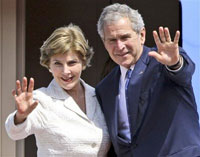Laura Bush says hello to Myanmar refugees
U.S. first lady Laura Bush, an outspoken critic of Myanmar's ruling junta, met Thursday with frustrated refugees who fled a brutal campaign by that country's military.

Mrs. Bush, accompanying U.S. President George W. Bush on a three-country swing through Asia, flew to the Thai-Myanmar border to spend the day at the Mae La refugee camp and a health clinic run by a woman known as the "Mother Teresa of Burma."
Mae La is home to 38,000 Karen, an ethnic minority group that rights organizations say is the target of an ongoing Myanmar military campaign marked by murders of civilians, rapes and razing of villages.
Myanmar, also known as Burma, denies the charges and says it is battling Karen insurgents.
Arriving in a light rain, Mrs. Bush was greeted at the camp by Karen dancers. She attended English and math classes for children at the camp and an orientation briefing for refugees going to third countries.
"We are refugees. Our dream is that we want to go home. But repatriation with dignity and safety is not possible right now," community leader Mahn Htun Htun told her during a discussion.
"Most people do not want to move to a third country. They would rather move home," Mrs. Bush responded.
Mrs. Bush reached the camp at about the same time her husband was delivering a speech in Bangkok, the Thai capital, calling for "an end to the tyranny in Burma."
"This noble cause has many devoted champions, and I happen to be married to one," the U.S. president said.
He also called on Myanmar's junta to release pro-democracy leader Aung San Suu Kyi and all other political prisoners.
Thai police said they arrested about 200 people in the border area, many of them thought to be students who crossed from Myanmar hoping to ask for help in bringing democracy to their homeland, the official Thai News Agency reported Thursday.
It did not give the date of the arrests or other details.
The Myanmar regime's decades-long conflict with a number of the country's ethnic minorities has sparked an ongoing exodus, and some 140,000 refugees now live in camps strung out along the Thai-Myanmar frontier.
"While these camps are supposed to be temporary camps, in reality, some people have been living here for over 20 years. Some were born in the camps and now they have their own children," said Sally Thompson, deputy director of the Thailand Burma Border Consortium, the key aid agency working in the camps. "They are entirely dependent on handouts, which is not good socially or psychologically."
She welcomed Mrs. Bush's visit, saying "a high-level visit is an opportunity to raise awareness about the issue."
"It is a protracted emergency which is hard to keep in the news, but there is human rights abuse going on virtually every day (in eastern Myanmar)," she said.
Mrs. Bush was also visiting the Mae Tao Clinic, run Dr. Cynthia Maung, a Karen Christian refugee who provides medical care on the Thai side of the border to more than 50,000 people from Myanmar every year.
Medical care is lacking in Myanmar and many of her patients trek to her health center from deep within Myanmar. Known as the "Mother Teresa of Burma," the doctor has received the Ramon Magsaysay Award, Asia's equivalent of the Nobel Prize, for her humanitarian work.
Kitty McKinsey, spokeswoman for the U.N. High Commissioner for Refugees in Thailand, said more than 30,000 Myanmar refugees have been resettled in third countries, including more than 21,000 who have left for the United States since January 2005.
Subscribe to Pravda.Ru Telegram channel, Facebook, RSS!




